DEFINITION OF STEREOTYPE
1. According to Wikipedia –
a) A stereotype is an over-generalized belief about a particular category of people. It is an expectation that people might have about every person of a particular group. The type of expectation can vary; it can be, for example, an expectation about the group’s personality, preferences, or ability.
b) Stereotypes are generalized because one assumes that the stereotype is true for each individual person in the category. While such generalizations may be useful when making quick decisions, they may be erroneous when applied to particular individuals. Stereotypes encourage prejudice and may arise for a number of reasons.
c) In social psychology, a stereotype is any thought widely adopted about specific types of individuals or certain ways of behaving intended to represent the entire group of those individuals or behaviours as a whole.
2. According to Cambridge dictionary
Cambridge dictionary explains the notion of stereotype as a “fixed idea people have about something or somebody, in particular about something wrong”.
According to the same dictionary, prejudices are “an opinion or an unfair and unreasonable feeling formed without enough thought or knowledge”.
In other words, stereotypes are preconceptions, cliches which individuals use frequently while prejudices are irrational feelings of fear and dislike. These can be understood as protection filters against the multitude of information which allows us to judge people without interacting personally with them or knowing them only superficially: they limit our view to reality.
3. According to my online research
A stereotype is a belief that all members of a given group share the same fixed personality traits or characteristics as a result of this group membership. Stereotypes are always based on an oversimplified generalization of a social group. For example:
- All young people have loads of energy and imagination
- All older people are lonely
- All women are great at multitasking
Stereotypes can be attached to any assumed marker of group membership, such as age, ethnicity, skin colour, gender, sexual orientation, family, religion and disability. It is important to note that we also stereotype our own group(s) as well as others. Needless to say, we often tend to emphasis our own ‘virtues’ by attributing positive labels to them.
For example: In Nigeria where I come from
- “The Yoruba’s are always dirty”
- “The Igbos like money”
- “The Hausa’s/Fulani’s are terrorist.”
DEFINITION OF LABELLING
1. According to Wikipedia
Labelling or using a label is describing someone or something in a word or short phrase. For example, describing someone who has broken a law as a criminal.
2. According to oxford
Assign to a category, especially inaccurately or restrictively.
TYPES OF STEREOTYPES
According to Wikipedia and social psychology
1. Explicit stereotypes
Explicit stereotypes are those people who are willing to verbalize and admit to other individuals. It also refers to stereotypes that one is aware that one holds, and is aware that one is using to judge people. People can attempt to consciously control the use of explicit stereotypes, even though their attempt to control may not be fully effective.
2. Implicit stereotypes
Implicit stereotypes are those that lay on individuals’ sub-consciousness, that they have no control or awareness of.
STEREOTYPES CAN BE NEGATIVE AND/OR POSITIVE
A negative Stereotypes goes like this, For example, belief in the stereotypical notion of NIGERIA mentality “The Yoruba’s are always dirty” while “The Igbos like money”. They forgot not all in Yoruba are dirty and also not all Igbos like money, they say such regardless of the individual person concerned.
Stereotypes do not necessarily need to be negative. While positive stereotypes may seem harmless enough it is important to recognize that all stereotypes are problematic because they tend to be patronizing in tone and damaging in effect.
Whether positive or negative it has its own effect on a group or individual. Here is a positive stereotype statement: ‘young people’ are ‘energetic’, ‘enthusiastic’, and ‘eager to learn’.
However, to complicate matters, it is also possible to express contradictory statements about the young people which I termed negative stereotype statement: ‘young people’, ‘youth’ or ‘teenagers’ are also often described as ‘being drinkers’, ‘loud’, ‘troublesome’ and ‘spoilt’.
STEREOTYPES, LABELLING AND SOCIAL RULES AND NORMS BETWEEN ADULTS AND CHILDREN.
Examples of stereotypes which are frequently used in relationships between adults and children:
”How are we supposed to buy this pink teddy bear? It’s for little girls, not for boys. Let’s look for another toy suitable for you”.
”I told you not to play in the mud. You are being dirty all day as if you were a boy not a girl. Look at the other little girls, they are all clean and they wear dresses, only you are full of mud”
They are reactions which many parents have when their children show preferences which are “not appropriate” to behaviors specific to boys, respectively to girls. There are the labeling or stereotypical requirements for children of a specific gender in our society today-
“Boys don’t cry”,
“Girls must be tidy, learn to cook and to clean”,
“Boys must be strong and girls delicate”,
“Boys are better at mathematics, exact sciences than girls”,
“Girls must be good at handiness activities (sewing, for instance)”.
Such stereotypes underline discrimination in various situations: girls who are not encouraged to develop a career in fields dominated by men or boys. They feel girls should have a more “gentle” behaviour than the boys.
ENVIRONMENT THAT UNDERPINNED LABELLING AND STEREOTYPES.
The environment where children learn these frequent labelling and stereotype are as follows:
- From TV;
- From video games;
- On internet;
- From school;
- In the family;
- From ads (both billboard and internet ads);
- From books.
Children are not born with stereotypes and they do not learn them either as a poem, they born from interaction with people. Stereotype are fixed opinion someone has about something or someone else without knowing many things about it. These fixed ideas are unfair and unjustifiable and made up of erroneous knowledge and a hasty generalization which arises in relation to them.
These idea are fused inside the children by watching plenty of stereotypical situations in TV and mass-media and they watch cartoons and games which built inside their personality and as they grow they become stereotypical adults.
Stereotypes and labelling show in time that the child’s skills and interests haven’t been valued. For Example;
1. A Stereotype like “boys do not cook, only girls ” does not allow boys which might be champions at this cooking to use and value all his inbuilt abilities
Firstly, I will backed it up with 3 QUOTES/ powerful statements made by FEMINIST/WRITER CHIMAMANDA NGOZI ADICHIE in terms of cooking and domestics chores.
FIRST BACK UP
According to a popular literature book “” WE SHOULD ALL BE FEMINIST “””
FEMINIST Adichie Chimanmanda Ngozi she says in her book:
“””””””””“Take cooking, for example. Today, women in general are more likely to do housework than men— cooking and cleaning. But why is that? Is it because women are born with a cooking gene or because over years they have been socialized to see cooking as their role? I was going to say that perhaps women are born with a cooking gene until I remembered that the majority of famous cooks in the world—who are given the fancy title of “chef”—are men. But what matters even more is our attitude, our mind-set. What if, in raising children, we focus on ability instead of gender? What if we focus on interest instead of gender? I know a family who has a son and a daughter, a year apart in age, both brilliant at school. When the boy is hungry, the parents say to the girl, Go and cook Indomie noodles for your brother. The girl doesn’t like to cook Indomie, but she is a girl and she has to. What if the parents, from the beginning, taught both children to cook Indomie? Cooking, by the way, is a useful and practical life skill for a boy to have—I’ve never thought it made much sense to leave such a crucial thing—the ability to nourish oneself —in the hands of others. “”””””””””””””
SECOND BACK UP
According to a popular literature book “” DEAR IJEAWELE OR A FEMINIST MANIFESTO IN FIFTEEN SUGGESTIONS “”
FEMINIST Adichie Chimanmanda Ngozi she says in her book:
THIRD SUGGESTIONS
“”””””””” The knowledge of cooking does not come pre-installed in a vagina. Cooking is learned. Cooking – domestic work in general – is a life skill that both men and women should ideally have. It is also a skill that can elude both men and women. We also need to question the idea of marriage as a prize to women, because that is the basis of these absurd debates. If we stop conditioning women to see marriage as a prize, then we would have fewer debates about a wife needing to cook in order to earn that prize. It is interesting to me how early the world starts to invent gender roles. “””””””””””
2. A stereotype like “girls do not play hockey, only boys”, does not allow girls which might be champions at this sport to use and value all her interest and abilities on it.
3. Another example is happens with ballet in case of boys who are not allowed to practice it because it turns them into “girls”. Sport is meant to develop our body, to create a discipline for individual, to show him how a positive competition is created and not to create him stereotypes.
Secondly, I will backed example 2 and 3 with 2 QUOTES/ powerful statements made by FEMINIST/WRITER CHIMAMANDA NGOZI ADICHIE in terms of children interest and ability.
FIRST BACKED UP
According to a popular literature book “” WE SHOULD ALL BE FEMINIST “””
FEMINIST ADICHIE CHIMANMANDA NGOZI she says in her book:
“””” But what matters even more is our attitude, our mind-set. What if, in raising children, we focus on ability instead of gender? What if we focus on interest instead of gender? “”””
SECOND BACKED UP
According to a popular literature book “DEAR IJEAWELE OR A FEMINIST MANIFESTO IN FIFTEEN SUGGESTIONS”
FEMINIST ADICHIE CHIMANMANDA NGOZI she says in her book:
TENTH SUGGESTIONS
‘’”” Be deliberate about how you engage with her and her appearance.
Encourage her participation in sports. Teach her to be physically active. Take walks with her. Swim. Run. Play tennis. Football. Table tennis. All kinds of sports. Any kind of sports. I think this is important not only because of the obvious health benefits but because it can help with all the body-image insecurities that the world thrusts on girls. Let Chizalum know that there is great value in being active. Studies show that girls generally stop playing sports as puberty arrives. Not surprising. Breasts and self-consciousness can get in the way of sports – I stopped playing football when my breasts first appeared because all I wanted to do was hide the existence of my breasts, and running and tackling didn’t help. Please try not to let that get in her way. ‘’””
THIRD BACK UP
Here is an interview with her.
For further reading here is the link to convince you.
Here is the question that was asked her about raising a girl child.
LAUREN ALIX BROWN: So in terms of teaching people how to be feminists, has raising a girl changed or challenged any of your suggestions for how to raise a feminist?
CHIMAMANDA NGOZI ADICHIE: It hasn’t challenged anything, it’s just that it’s made me realize how difficult it is. Because I think I felt that. I’m only just realizing that sometimes it feels like the universe is conspiring against me. Because I am trying to push against ideas and norms that are so ingrained that they can start to feel invisible. And it’s little things. I’m just amazed at how everything is gendered. Also, I’m just realizing how early the sexualization of girls starts. Four-year-old girls’ dresses. I find many of them disturbing. It’s sort of like four year olds’ now have to be mini women. I’m noticing these things a lot more just because of my child. And children’s books and cartoons. It does sometimes feel that there’s a conspiracy of the universe. But at the same time, I’m utterly undeterred. It requires pushing back, but I’m going to push back. I want to equip her with the tools. I’m hoping that she grows up to be the girl who sort of mocks these things—who gets it and who mocks them. That’s my hope that would be ideal for me.
WAY IN WHICH PEOPLE STEREOTYPE AND LABEL IN THE SOCIETY.
People are not all the same. People might have lots of things in common but the ‘category’ of people with different identities and situations. People are diverse. Being diverse means people having a variety of characteristics, beliefs and values. In any one group of people we have different of stereotyping people base on the following;
- Ethnicity
- Family structure
- Age
- Gender
- Ability/disability
- Religious belief
- Sexual orientation
- Skin colour

IDEAS ON AND WAYS TO CHALLENGE LABELLING AND STEREOTYPING
After gathering of information from my students I was able to come up with some ideas to tackle labelling and stereotyping in the society (PATRICK STORIES personal ideas). They are followed by a few suggestions on how you could begin to change these labelling and stereotyping.
- The Media
- The Local Community
- Security Staff
- Politicians & Decision-makers
- Teachers and Schools
1. THE MEDIA
Media has assumed a significant role in the nations of the world in that it not only allows extensive networking but also brings nations closer together by easy dissemination of news and opinions. The media create images and ideas independently. Therefore the media is a powerful communicator of ideas that may have originated elsewhere. These images and ideas can reflect stereotypes or labelling of group, gender, physical traits, social status, race, beliefs, behaviour styles and career.
Stereotypes behaviours are mostly endorsed by influential people and/or institutions using the media as an avenue for them to have a powerful impact. As with all forms of media, messages perpetrated through media can have good and bad influences on society and youngsters in particular.
PATRICK STORIES PERSONAL IDEAS ON AND WAYS TO CHALLENGE LABELLING AND STEREOTYPING THROUGH MEDIA.
Here are my ideas on how to tackle media propagation of stereotype and labelling in the society;
a. Media Monitoring
Start collecting images and stories from newspapers, the internet and magazines about people (young)
Cut out all the stories and identify the positive ones as well as the negative ones. At the end of three months or even a year, put all of the stories together and see if there are any trends emerging?
Report your findings to your local media.
b. Write your own articles
Contact the editor of your local paper with the idea of featuring a series of articles by, and about, people belief and ethnicity and your focus should be on labelling and stereotype.
c. Community Radio
Approach your local community radio to do a feature on people or ask to produce a program yourself. The station might provide young people with training or find opportunities to get young people involved.
2.THE LOCAL COMMUNITY
Local community is another factor that lead to labelling, inequality and Stereotyping of people who do not belong to that community. Here the local community use the notion of their belief and ethnicity to judges other people who don’t belong to them. There conditioned ideas are they copied by young ones/teenagers which they later pass to their generation when they are adult.
PATRICK STORIES PERSONAL IDEAS ON AND WAYS TO CHALLENGE LABELLING AND STEREOTYPING THROUGH THE LOCAL COMMUNITY
a. Share the REAL news
When people in your community do something good or positive, tell other people.
b. Partnership works
Invite members of the local resident or community association to your organized party (like during festive period). Let them know about the activities you usually do on a festive period. Ask them about their association and see if there is any project that you could work on together with them. Explore whether you could identify a space in the community where young people come together to share ideas. Through this process partnership is already working.
c. Celebrate People
Hold an awards event to celebrate the talent and contribution people make to the community.
Find a local celebrity to present the awards and invite young/adults in the community and the media. Have information stands on all of the work you have done over the year in your community.
3. SECURITY STAFF
Security staff of various establishment also place label on people especially the young ones in relation to shopping and commercial venues. The young people reported that they were often ‘followed’ by security staff and were treated differently because of their age, dress code and also hairstyle.
Some report of young one are as follows concerning the labelling on them.
- If you’re wearing a hoodie you’re intimidating or you are suspected as a thief trying to hold his/her identity. They usually forgot is what they like to wear.
- If there’s a load of adults standing around, they’ll say nothing. If we were standing there they’d tell us to move, but if there was a load of adults they’d just leave them there.”
- If a young person drives a car with pack of his/her friends going for outing, he/she is suspected to be in to fraudulent activities.
- Hairstyles (dreadlock, long hair) is a another factor young ones face in the society, they are regarded as being indecent and most of them are not allowed in some establishment or given attention by security staff.
- Another is the dress code that this young ones wear, a casual wears is regarded as been not gentle but a co-operate wear signifies he is humble and honest.
PATRICK STORIES PERSONAL IDEAS ON AND WAYS TO CHALLENGE LABELLING AND STEREOTYPING BY THE SECURITY STAFF.
a. Follow instructions given by the security staff
When you are suspected of such behaviour always try and obey instruction given on the notice of that establishment. For Example, no entering of the bank with metal material to avoid being suspicious.
b. Always comply with what a security staff says to you.
Don’t feel annoyed over little instruction to you to do. These thing are used as a test to check upon people that are being suspected. For example, if you’re wearing a hoodie you’re intimidating or you are suspected as a thief trying to hold his/her identity. They usually forgot is what they like to wear
c. Always try to avoid situation that may label you.
Most of these security staff have been trained to identify people character that is being suspicious. At these point just make sure you follow a procedure that is not suspicious to avoid been harassed in public
d. We’re just shopping!
If you or your friends are experiencing problems with the security staff of a shopping Centre/ shop, you could consider doing something about it. How about getting everyone collect their shopping receipts from the shopping center for a period of two months or so? When you have gathered enough ‘evidence’ why not send a letter outlining your grievances to the manager of the shopping centre? Attach the receipts to the letter and arrange a meeting with a representative of the shopping centre to explore any issues that both sides may have in relation to young people using the facilities.
4. TEACHERS AND SCHOOLS
Many of the people says that ‘Inequality, labelling and the Stereotyping of People’ of people sometimes begin in schools and is headed by teachers. Most of these schools or teachers inculcate these notion of stereotype on them. Most of the pupils/students are not given a “say or no voice” in decisions made about how the school was run.
For me personally (patrick stories), ‘I think the way schools should be run is it should work between the pupils/students and the teachers, where the rules would be worked out between the two so it benefits everyone.’
However, another factor is the students and teachers relationship were dependent on the personality of the teacher and whether they were prepared to engage with them or not.
‘Some teachers are more understanding and more about the individual whereas other teachers kind of just think I’m the teacher, do as I say and I don’t have to give you a reason, you know, this is how it’s going to be. But they don’t seem to recognize that they can be wrong.’
PATRICK STORIES PERSONAL IDEAS ON AND WAYS TO CHALLENGE LABELLING AND STEREOTYPING BY TEACHERS AND SCHOOLS
a. Get involved in the Student Council
Ask your Student representative to put the issue of ‘negative stereotyping’ of young people on the agenda for the next meeting. Get the Council to look at issues that discriminate against students.
b. Work with the School Council to promote anti-bullying/harassment policies and procedures for your school.
If your school does not have a policy in place, suggest that such a policy is developed with an input from the student body. Make sure that the policy names and addresses issues such as sexual harassment and other forms of harassment. If your school has a policy in place, suggest that a plan of action is drawn up to implement the policy.
REASONS TO LET GO OF LABELLING AND STEREOTYPES
In society we are often told to conform to certain norms instead of being open and focused on discovering the truth about ourselves and the universe. From the time we are born till much later into adulthood we are programmed to worry about what other people think of us. We label ourselves and others based on generalized notions of what we ‘should’ be like with respect to age group, gender, physical traits, social status, race, beliefs, career, behaviour styles ethnicity, family structure, ability/disability, sexual orientation, skin colour.
Here are some reasons of why and how we can avoid some of effect of labelling and stereotypes.
1. FOCUSING ON WHAT REALLY MATTERS:
Instead of worrying about whether you ‘fit into’ social perceptions regarding how we should behave with respect to our age, gender, physical traits, social status, race, beliefs, career we might find that focusing upon our core or essential values like health, well-being, inner joy and self-development could be far more beneficial as these are things that actually matter for each and every person in the world. Instead of these core or essential values and also looking deeper within ourselves we have been distracted by society/social expectations of how to talk, how to dress and how to behave.
2. EVOLVING HIGHER THAN THE NORMS:
If all people were to ‘fit into’ specific parameters of thinking and behaving nobody would ever discover anything new. We would constantly imitate the crowd instead of learning new things, trying new ways of living or progressing higher than generic social norms already prevalent in society. If we continue to conform to whatever is believed, practiced and preached to the masses by our predecessors our thinking and ideas will be limited. Innovation, self-realization and transformation can only take place when we have the courage to step out of the matrix of widely prevalent routines, rules and expectations.
3. COMPLETE SELF-ACCEPTANCE:
Society would always say something like how we are and how we are supposed to be like other normal people. Stereotypes regarding the right clothing, makeup, choice of vocation, body-type, hobbies and interests can sometimes feel restrictive. We all are expected to develop different personalities, talents, physiques and points of view over time on a particular thing, these things can totally define who we really are. We need to keep expanding our minds and allow ourselves to not be limited by prescribed notions or norms by the society of these things make us feel inferior. We are more than just a gender, a profession, a belief system, a physical body, an ethnic group or nationality. By letting go of all such labels and stereotype addressing we can embrace a full acceptance of our true self.
4. EQUALITY:
Stereotypes regarding gender, spirituality, race, cultures can all influence us consciously and subconsciously with false ideas such as ‘pink is a feminine colour’, “blue colour is for boys”, or ‘white is more positive than black’, or “gurus are intelligent people” or ‘gurus are men with long beards’. Disregards all notions that often result in gender and racial discrimination which is commonly accepted in society. Notions of what is masculine or feminine in fashion, in terms of career and false perceptions regarding ‘black or dark being evil versus white being good’ need to be discarded from our everyday thinking, language and choices. Through these you are defining or heading towards equality of all social norms/notions.
5. STAYING NON-JUDGEMENTAL:
By letting go of outward perceptions based on appearances we can avoid judging each other through our limited thinking. We need to focus more on who we are instead of judging other people as ‘good’ or ‘bad’, ‘right’ or ‘wrong’, ‘deserving’ or ‘undeserving’. We can never truly know another person because we hardly know enough about ourselves. The people we come across in our life often reflect our inner thoughts and characteristics that are hidden within us. By realizing that everything we encounter is either a reflection or a shadow of our own energy, we can let go of judgments and embrace our light.
6. AWAKENING OUR CONSCIOUSNESS:
Most scientific breakthroughs and enlightenments are thanks to those people who did not conform to conditioned ideas and thinking of the society. Instead they focused on raising their own awareness of who they are. Through meditation and self-realization we automatically begin to shed all our labels and dissolve into a higher light of truth. We can awake our consciousness through developing our inner skills, powers and qualities.
10 QUOTES ON STEREOTYPE AND LABELLING FROM POPULAR PEOPLE
1.
“” The single story creates stereotypes, and the problem with stereotypes is not that they are untrue, but that they are incomplete. They make one story become the only story. “”
Chimamanda Ngozi Adichie
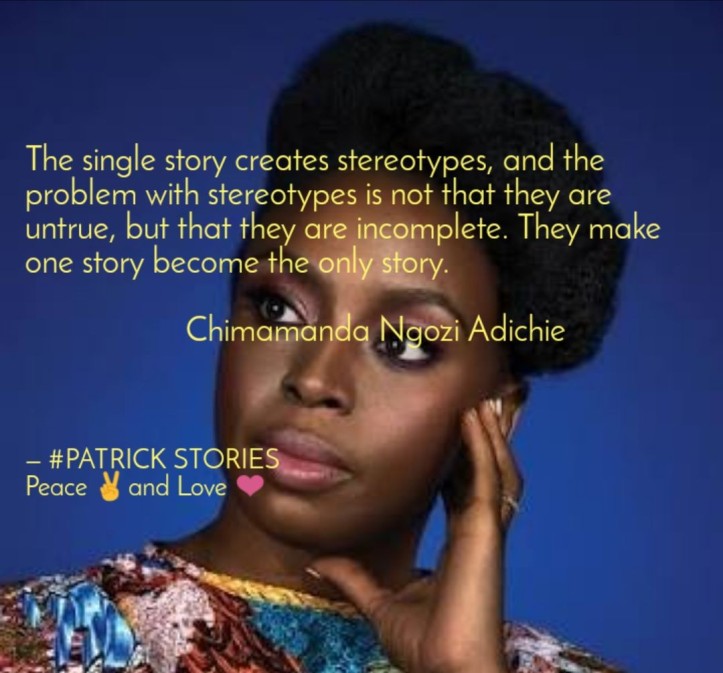
2.
I consider it part of my responsibility as President of the United States to fight against negative stereotypes of Islam wherever they appear.
Barack Obama

3.
We slaughter one another in our words and attitudes. We slaughter one another in the stereotypes and mistrust that linger in our heads, and the words of hate we spew from our lips.
Nelson Mandela
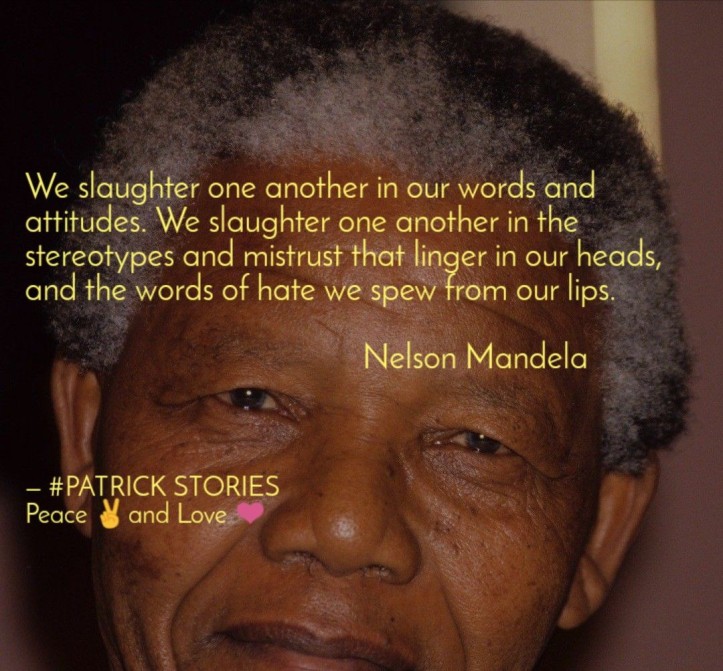
4.
There’s a difference between being yourself and being your stereotype.
Iggy Azalea

5.
Stereotypes do exist, but we have to walk through them.
Forest Whitaker

6.
a. We must reject not only the stereotypes that others have of us but also those that we have of ourselves.
b. The emotional, sexual, and psychological stereotyping of females begins when the doctor says, ‘It’s a girl.’
Shirley Chisholm
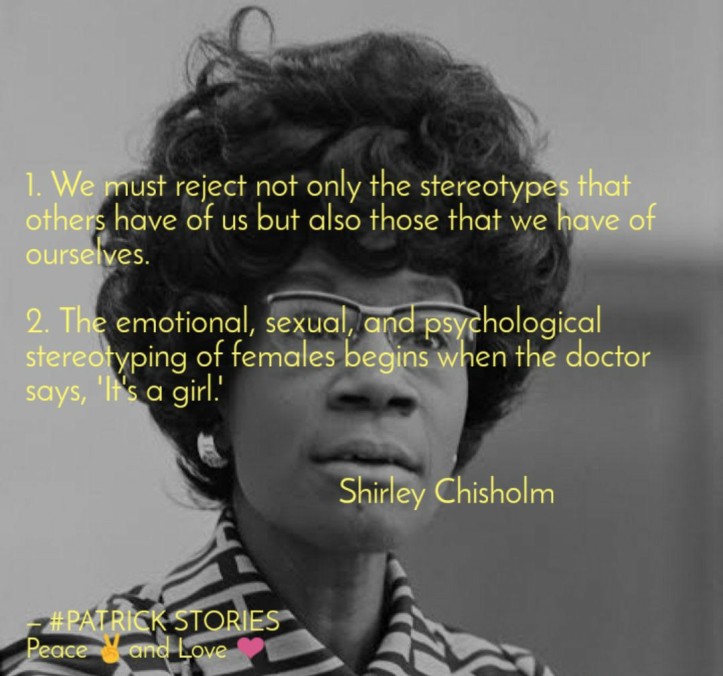
7.
Instead of being presented with stereotypes by age, sex, color, class, or religion, children must have the opportunity to learn that within each range, some people are loathsome and some are delightful.
Margaret Mead

8.
The problem with labels is that they lead to stereotypes and stereotypes lead to generalizations and generalizations lead to assumptions and assumptions lead back to stereotypes. It’s a vicious cycle, and after you go around and around a bunch of times you end up believing that all vegans only eat cabbage and all gay people love musicals.
Ellen DeGeneres
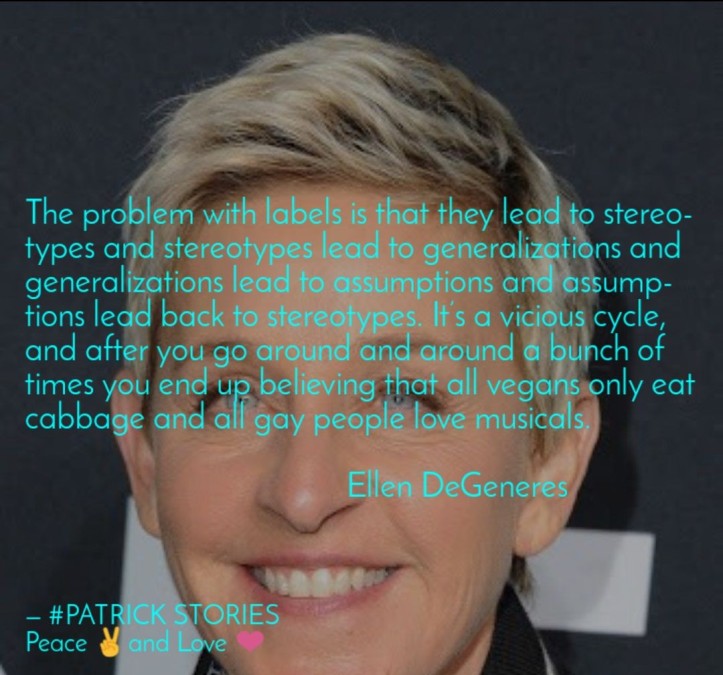
9.
People are much deeper than stereotypes. That’s the first place our minds go. Then you get to know them and you hear their stories, and you say, ‘I’d have never guessed.
Carson Kressley
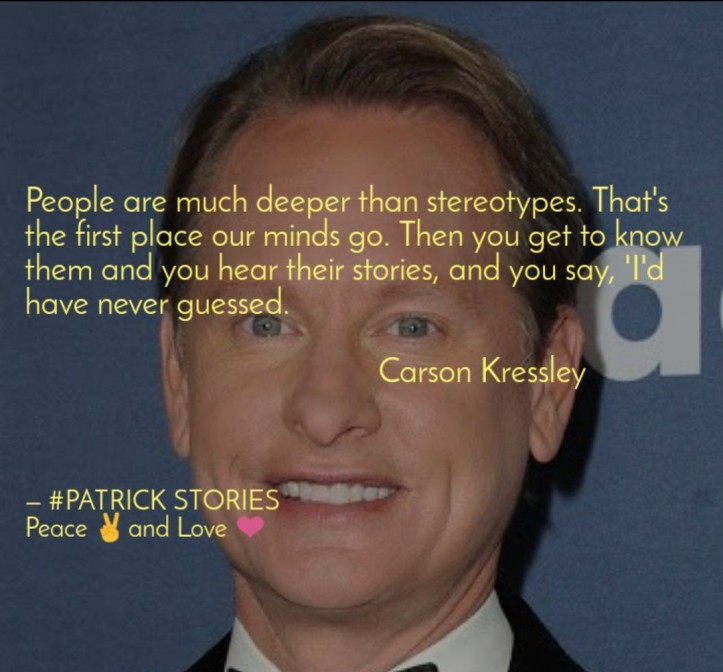
10.
Stereotypes lose their power when the world is found to be more complex than the stereotype would suggest. When we learn that individuals do not fit the group stereotype, then it begins to fall apart.
Ed Koch
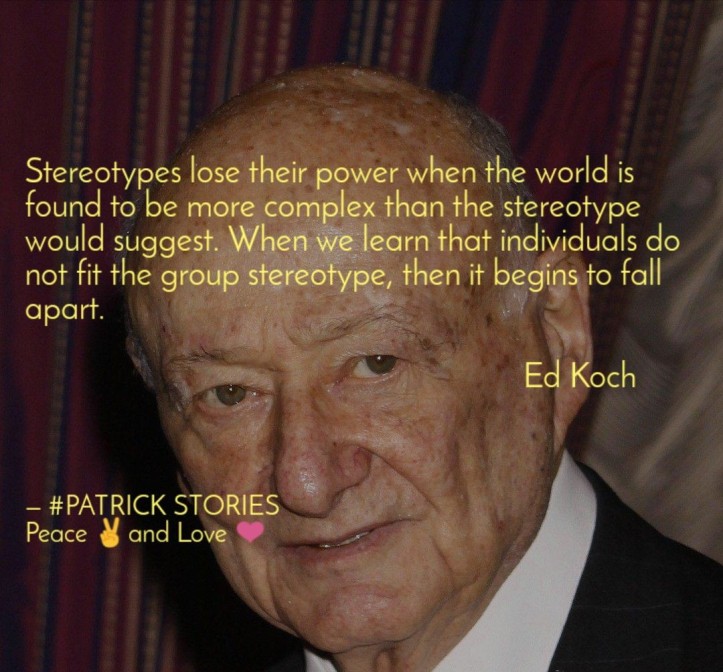
I will like to ask a simple question for my fellow readers and viewers.
- What is your own views and contributions on this articles?
- What was your own experience of being a man or a women in a gendered role or stereotypical society?
- Do you agree the society perception about gender role designated to male and female is wrong or right?
Please let me know all your reactions, views and insights in the comment box below!
Written by:
Kogwuonye Patrick Onyeka
Writer/Blogger/Educator/Tutor
University of Benin
www.facebook.com/uniqueresearching
Credited to:
Those who experience labelling and stereotypical character from the society in relationship, social and status.



Great report, Mr. Patrick Stories. This stereotyping has caused much damage, and, as you stated, the “science” of it is getting more advanced, as the people start to realize and understand this bad game that is being played on us. Big trick here in U.S.A. is when the news (and other types of medias) first define the “sides” in their divide-game, and then, telling each ” side” that ,” the others do not like you “. When somebody thinks that others do not like them, this creates a psychological wall, more powerful than any brick wall. Thank you for your post, which knocks that wall down ! God Bless !
LikeLiked by 1 person
Thanks for sharing your own view and contributions on this articles? I really appreciate that very much. Am happy for that.
Some questions that was after before you where not answered.
I will like to ask a simple question for my fellow readers and viewers.
What was your own experience of being a man or a women in a gendered role or stereotypical society?
Do you agree the society perception about gender role designated to male and female is wrong or right?
Please let me know all your reactions, views and insights in the comment box below!
You are welcome Mr/Mrs/Miss
#PATRICKSTORIES
Peace ✌and Love ❤
LikeLiked by 1 person
Thank you, Patrick Stories, I will consider this question for awhile, I may not have a worthwhile answer to offer, though.
LikeLiked by 1 person
You are welcome. I will be waiting for your answer.
#PATRICKSTORIES
Peace ✌and Love ❤
LikeLiked by 1 person
Sorry Mr. Stories, I don’t think I have anything worthwhile to add to the subject, but thank you for getting me to think !
LikeLiked by 1 person
Thanks for the comment you gave. Patrickstories appreciate that very much.
Stay cool. And enjoy the festive season
You are welcome.
#PATRICKSTORIES
Peace ✌and Love ❤
LikeLike
You, too, Patrrickstories, thank you ! I look forward to more of your post
LikeLiked by 1 person
You are welcome
#PATRICKSTORIES
Peace ✌and Love ❤
LikeLike
I do not disregard the minds natural desire to classify others using the self as a benchmark yet it is by understanding that we are all the SAME with differing diverse qualities you learn to do this less.
People are not different (IMO) we all share the same make up and experiences the only difference is how. If more of us realised that we would let go of the desire to label and control. Live and let live.
LikeLiked by 1 person
Thanks for sharing your own view and contributions on this articles? I really appreciate that very much. Am happy for that.
I learnt something new again according to your comment-
Its says –
“”” If more of us realised that we would let go of the desire to label and control. Live and let live. “””
That phrase made me happy now.
Some questions that was after before you where not answered.
I will like to ask a simple question for my fellow readers and viewers.
What was your own experience of being a man or a women in a gendered role or stereotypical society?
Do you agree the society perception about gender role designated to male and female is wrong or right?
Please let me know all your reactions, views and insights in the comment box below!
You are welcome
#PATRICKSTORIES
Peace ✌and Love ❤
LikeLiked by 1 person
Very interesting. Never actually looked at this way or broke it down. I enjoyed reading this. The saying knowledge is power is so true. I love to learn. It is not like I didn’t know this already but did not know how it was broken down. Thank you.
LikeLiked by 1 person
Thanks for the time you use in reading my post.
Herr is a quotation for you-
“””” You are you and just because you have a different way of thinking doesn’t mean you are a certain type of person. Everybody is not made for everyone and that’s perfectly fine. Acceptance is key and when you are firm in who are you there is nothing no one can say that can change it. I had several friends who were atheist and because we didn’t try to change each other the friendship worked. No arguments, we could have conversations without screaming or yelling, and even our families were cordial to each other. Once you are comfortable in your own skin nothing can penetrate it. “””
This is just a little quotation I brought out this year about stereotype.
You are welcome Mrs Gold
#PATRICKSTORIES
Peace ✌and Love ❤
LikeLiked by 1 person
By the way I shared this. I hope you don’t mind. I thought everyone should read this as many people do stereotype everyday. It is a known fact and sometimes people do it and don’t even realize they do it. I have been guilty of it myself at times. Although I try not to. Take for instance makeup and skincare. More and more men are using it today than years ago. So now instead of marking things “for women” i mark them “unisex” because it is not just for women anymore.
LikeLiked by 2 people
Oh am touch by this comment. this blew me away. Thank you for taking the time to share these write up through these words.
These words are painted in truth, experience and perspective. I especially love how you stated this example- “””Take for instance makeup and skincare. More and more men are using it today than years ago. So now instead of marking things “for women” i mark them “unisex” because it is not just for women anymore. “”””””
Beautifully written and as I read through again on each line I was amazed . Each word you used are true and reflective of my personal encounter with men and women base on skin care.
This produced a smile on my tired face after a long day. You’re appreciated.
Some questions that was after before you where not answered.
I will like to ask a simple question for my fellow readers and viewers.
1. What was your own experience of being a man or a women in a gendered role or stereotypical society?
2. Do you agree the society perception about gender role designated to male and female is wrong or right?
Please let me know all your reactions, views and insights in the comment box below!
You are welcome
#PATRICKSTORIES
Peace ✌and Love ❤
LikeLiked by 1 person
It is probably all of the things, every person responds differently as well. When I was in school for physics, and there was two girls. One instructor was hard on us, telling us we could not be physicists because we were woman and we needed to raise children – she dropped out. It pushed me on. So what works on one, does not work on another. I see things changing and see differences over the years.
LikeLiked by 1 person
Thanks for sharing your own view and contributions on this articles? I really appreciate that very much. Am happy for that.
Stereotype has gotten deep in to the society. It affect both the men and the women.
You are welcome
#PATRICKSTORIES
Peace ✌and Love ❤
LikeLike
Greetings! I love your work and how thought evoking it is. You’ve tackled big ideas and concepts with your writing!I’m in love with your work and a huge fan😊 I was wondering if you could checkout my new piece on stereotypes that create hostile sexism and sexist humour. And I would really appreciate it if you could comment some feedback to improve the writing style. Looking forward to hearing from you. – Kiran
LikeLiked by 1 person
Thanks for the comments. I appreciate your time and effort used in reading my articles. Thanks again. Am so sorry for not replying all this while. My schedule was tight.
Love this touching words you used-
“” Greetings! I love your work and how thought evoking it is. “”
I appreciate that very much.
Please here some questions put across you where not answered. I wish to see a good inspirational answer to those questions.
1. What is your own views and contributions on this articles?
2. What was your own experience of being a man or a women in a gendered role or stereotypical society?
3. Do you agree the society perception about gender role designated to male and female is wrong or right?
Please let me know all your reactions, views and insights in the comment box below!
You are welcome
#PATRICKSTORIES
Peace ✌and Love ❤
LikeLike